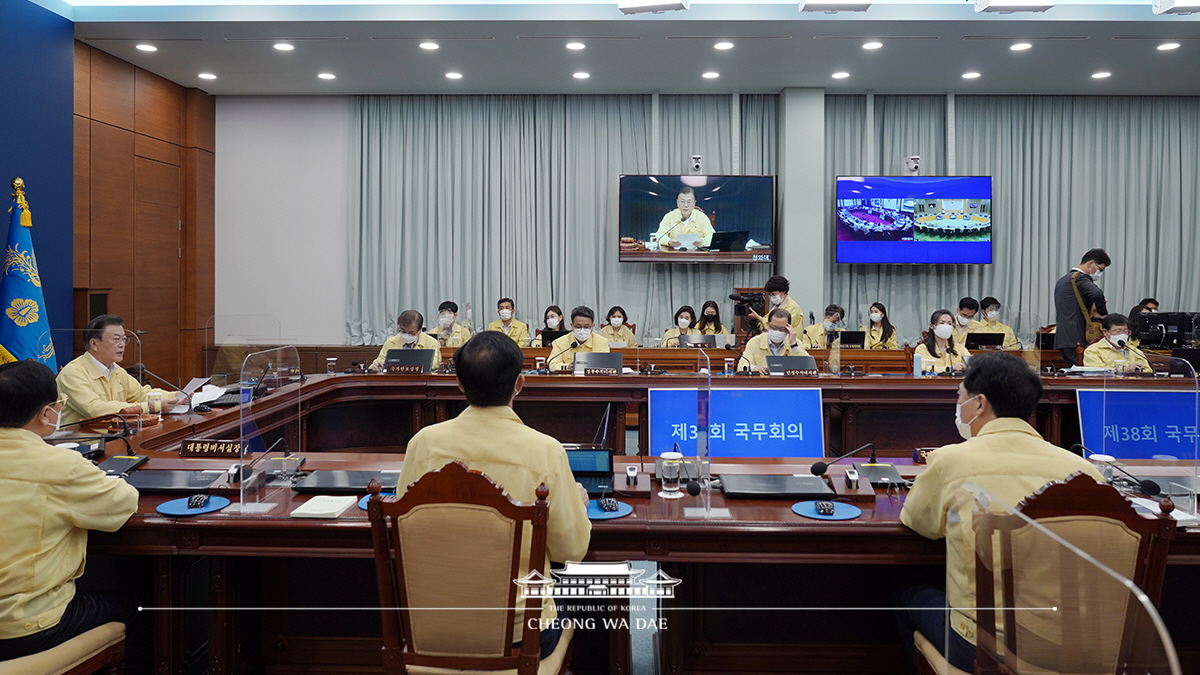이 웹사이트는 제19대 대통령 임기 종료에 따라 대통령기록관이 「대통령기록물 관리에 관한 법률」에 의해 이관받아 서비스하는 대통령기록물입니다. 자료의 열람만 가능하며 수정 · 추가 · 삭제는 불가능합니다.
다만, 「개인정보보호법」에 의하여 개인의 정보를 보호받기 원하시는 분은 관련 내용(요청자, 요청내용, 연락처, 글위치)을 대통령 웹기록물 담당자(044-211-2253)에게 요청해 주시면 신속히 검토하여 조치해 드리겠습니다. 감사합니다.
SPEECHES & REMARKS
BRIEFINGS

Let me begin the 38th Cabinet Meeting.
Today, we will deliberate on and set next year’s budget proposal for submission to the National Assembly. As the last of my Administration, this 604.4 trillion won budget has been drawn up to clearly reflect the role the Government has to assume at this juncture and the direction of fiscal investments.
Amid this unprecedented emergency situation, my Administration has been spurring efforts to overcome national crises and transition into a pacesetting economy through an expansionary fiscal policy. Last year and again this year, we have genuinely felt the effects of the expansionary fiscal policy. This has been a common way not only for Korea but also countries around the world to cope with these crises. Fortunately, as we could afford to implement an expansionary fiscal policy, we have had the means to respond to these crises.
With the COVID-19 pandemic causing significant private sector contraction, the proactive fiscal policy has been serving as a pump primer to revive the economy, stimulating private-sector investment and consumption. Korea has become the nation with the fastest and strongest economic recovery among the major advanced countries, according to assessments by the OECD, IMF and other international organizations as well as global credit rating agencies. The Korean economy is projected to achieve high growth – more than 4 percent – this year. All of this can be attributed to expansionary fiscal spending. In addition, government fiscal spending is buttressing small- and microbusiness owners, the self-employed and the vulnerable – helping to preserve jobs and livelihoods, ease growing market income gaps and improve income distribution.
The role of fiscal spending has also increased to facilitate our emergence as a leading nation and the transition to a pacesetting economy. Funds will be actively injected into the Korean New Deal to accelerate our digital and green transitions. This is also intended to achieve an inclusiveness that reduces disparities by strengthening the social and employment safety nets and expanding investments in people. Fiscal spending also plays an immense role in vigorously nurturing our future flagship industries in such new fields as data, networks, artificial intelligence, semiconductors, biohealth, future cars and batteries as well as enhancing our economy’s dynamism by spreading the second venture boom.
In this time of crisis, our expansionary fiscal policy has generated a virtuous cycle; economic recovery and increasing tax revenues are leading to improved fiscal soundness. Active fiscal investments have accelerated the economic recovery and promoted growth. The resultant tax revenue increases have also helped reduce our fiscal deficits, slowing the increases in our sovereign debt-to-GDP ratio.
The Government has drawn up next year’s budget in an expansionary manner for “full recovery and a strong economy.” The rationale is that we have a long way to go before achieving full recovery and active fiscal spending is still urgently needed to respond to overwhelming changes, including the reorganization of global supply chains; the shifts in the global trade order; and the transition to a low-carbon, digital economy.
The budget for next year focuses on completely overcoming COVID-19 and strategically investing in our country’s future. Above all, we will do all we can to surmount the virus entirely. Before anything else, enough funds were earmarked to cover epidemic prevention and control and vaccination. We will preemptively secure sufficient vaccine supplies. Together with the efforts to increase the number of hospital beds and medical personnel as well as improve medical infrastructure overall, we will expand support for the development of homegrown vaccines and our emergence as a global vaccine hub.
The key to completely surmounting COVID-19 is an inclusive recovery. We will provide compensation for microbusiness owners’ losses and concentrate on quickly recovering employment figures. At the same time, we will further strengthen the social safety net to resolve inequality and alleviate disparities in five areas: education, housing, medical services, caregiving and culture. Generous support, including the Youth Hope Ladder program, will be given to young adults as well.
Meanwhile, we will focus on strategic investments for the future of the country, thereby firmly laying the foundation for a leap forward as a pacesetting nation. Most of all, carbon neutrality is of paramount importance as it determines the future competitiveness of our economy as well as the sustainability of the global community. Along with efforts to make industries low carbon across the board, we will become leaders in the hydrogen economy and other promising green industries and expand support for a just transition. Full-fledged support will also be provided for greenhouse gas reduction through the establishment of a climate response fund.
By strongly pushing for a more evolved Korean New Deal, we will expand investments in the digital transformation and future industries. Investment in the Human New Deal, which has become a new pillar, will also be made in earnest. Along with investment in human resources to nurture innovative, talented individuals in such areas as artificial intelligence, semiconductors and software, we will significantly strengthen the employment and social safety nets, for instance, by expanding employment insurance eligibility and starting a pilot project for injury and sickness benefits.
Amid the upheaval and tremendous shifts in the world order, we are entering a very critical period for the nation. The role of fiscal spending is more important than ever. My Administration is destined to fulfill its role as a government that overcomes crises until the very end of my term. In a bid to live up to our responsibilities, I ask each ministry to do its utmost to communicate and cooperate with the National Assembly more actively so that the Government’s budget proposal can be passed.



